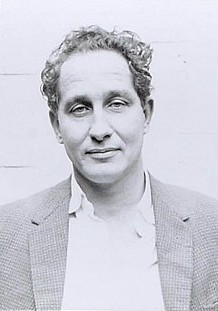
The Great Train Robbery was the robbery of £2.61 million from a Royal Mail train travelling from Glasgow to London on the West Coast Main Line in the early hours of 8 August 1963 at Bridego Railway Bridge, Ledburn, near Mentmore in Buckinghamshire, England.
The Flying Squad is a branch of the Serious and Organised Crime Command within London's Metropolitan Police Service. It is also known as the Robbery Squad, Specialist Crime Directorate 7, SC&O7 and SO7. It is nicknamed The Sweeney, an abbreviation of the Cockney rhyming slang "Sweeney Todd".

Ronald Arthur Biggs was an English criminal who helped plan and carry out the Great Train Robbery of 1963. He subsequently became notorious for his escape from prison in 1965, living as a fugitive for 36 years, and for his various publicity stunts while in exile. In 2001, Biggs returned to the United Kingdom and spent several years in prison, where his health rapidly declined. He was released from prison on compassionate grounds in August 2009 and died in a nursing home in December 2013.
The Criminal Investigation Department (CID) is the branch of a police force to which most plainclothes detectives belong in the United Kingdom and many Commonwealth nations. A force's CID is distinct from its Special Branch. The name derives from the CID of the Metropolitan Police, formed on 8 April 1878 by C. E. Howard Vincent as a re-formation of its Detective Branch. British colonial police forces all over the world adopted the terminology developed in the UK in the 19th and early 20th centuries, and later the police forces of those countries often retained it after independence. English-language media often use "CID" as a translation to refer to comparable organisations in other countries.

Sir Robert Mark was a senior British police officer who served as Chief Constable of Leicester City Police, and later as Commissioner of the Metropolitan Police from 1972 to 1977.
Derek Creighton "Bertie" Smalls was considered by many as Britain's first supergrass. Although there have been informers throughout history – the Kray twins were partly convicted two years before Smalls on evidence given by Leslie Payne – the Smalls case was significant for three reasons: the first informer to give the police volume names of his associates and provide the evidence that would send dozens of them to prison to serve long sentences; the first criminal informer to strike a written deal with the Director of Public Prosecutions; the only criminal informer to serve no time for his crime in return for providing Queen's evidence.
Shirley Cameron Becke was a British police officer. She was the fourth and last commander of the London Metropolitan Police's A4 Branch, from 1966 to 1973, and the first woman officer in the United Kingdom to reach chief officer rank when she was promoted to commander in 1969.

Sweeney 2 is a 1978 British action crime drama film. It was made as a sequel to the successful 1977 film Sweeney!. Both films are an extension of the popular British ITV television series The Sweeney (1975–78). Some of the action in the film is transferred from the usual London setting to Malta.
The Paedophile Unit is a branch of the Metropolitan Police Service's Child Abuse Investigation Command, based at Scotland Yard in London, England. It operates against the manufacture and distribution of child pornography, online child grooming, and "predatory paedophiles online", and organised crime associated with these.

The Millennium Dome raid was an attempted robbery of the Millennium Dome's diamond exhibition in Greenwich, South East London occurring on 7 November 2000. A local gang planned to ram-raid the De Beers diamond exhibition, which was held in the riverside Dome. The gang had then planned to escape via the Thames in a speedboat.

Thomas Marius Joseph Butler was a Detective Chief Superintendent in the Metropolitan Police in London. He was most notable for leading the team of detectives that investigated the Great Train Robbery in 1963. He never married and lived with his mother. Butler was arguably the most renowned head of the Flying Squad in its history. He became known as "One Day" Tommy for the speed with which he apprehended criminals and the "Grey Fox" for his shrewdness.

The Criminal Investigation Department is a specialized intelligence and investigation wing of the Bangladesh Police. It is headquartered in Malibagh, Dhaka and maintains a training school named the Detective Training School. Personnel attached to this wing essentially work in plain clothes. Mohammad Ali Mia, BPM, PPM is the head of the Criminal Investigation Department.

The Sweeney is a 2012 British action drama film, inspired by the 1970s The Sweeney, the British television police drama of the same name, but set in contemporary London. Written and directed by Nick Love, from a story by Love and John Hodge, it is based on the characters created by Ian Kennedy Martin. It stars Ray Winstone as Jack Regan, Plan B as George Carter, and Damian Lewis as Frank Haskins, with Allen Leech and Hayley Atwell.
Chief inspector is a rank used in police forces which follow the British model. In countries outside Britain, it is sometimes referred to as chief inspector of police (CIP).
William Taylor CBE QPM is a retired British police officer.

The Great Train Robbery is a two-part British television miniseries, written by Chris Chibnall, that was first broadcast on BBC One on 18 and 19 December 2013. The series is distributed worldwide by Kew Media.
Ernest Malcolm Fewtrell was a Detective Chief Superintendent in the Buckinghamshire Constabulary and head of Buckinghamshire CID. He led the initial investigation into the Great Train Robbery in 1963.
Leonard Ernest "Nipper" Read, QPM was a British police officer and boxing administrator.

Alexander Anthony Eist BEM was a detective at Scotland Yard during the 1960s and 1970s. He is particularly notable for the many allegations of corruption made against him. These included complicity in jewel robberies and providing false alibis to criminals. He later provided testimony to the United States House Select Committee on Assassinations regarding the assassination of Martin Luther King, whose killer—James Earl Ray—had been in his custody following Ray's escape to London in 1968.









